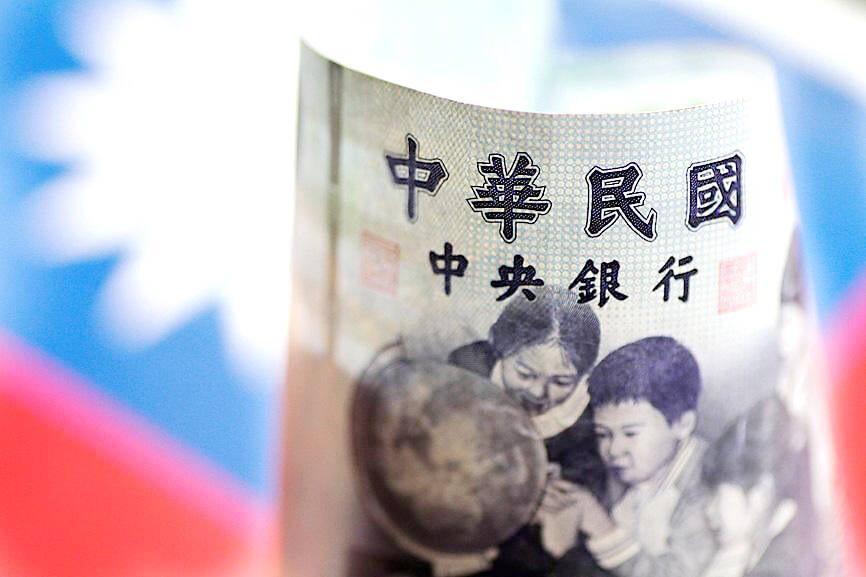The Executive Yuan would propose a special budget of NT$545 billion (US$18.15 billion) that includes a nationwide cash handout of NT$10,000, sources said yesterday, adding that a clause would be included to exclude wealthy households from receiving the cash handout.
The legislature on July 11 passed the third reading of the Special Act for Strengthening Economic, Social and National Security Resilience in Response to International Circumstances (因應國際情勢強化經濟社會及國土安全韌性特別條例), which included a NT$10,000 cash handout proposed by the Chinese Nationalist Party (KMT), which raised the package’s ceiling from NT$410 billion to NT$545 billion.
The package also includes NT$150 billion for whole-of-society defense resilience, NT$93 billion for industry and employment support, and NT$67 billion for social support, the NT$100 billion subsidy for supporting state-run Taiwan Power Co (Taipower, 台電) was removed.

Photo: Reuters
As the government’s hesitance regarding agreeing to the cash handout was considered by some Democratic Progressive Party members as a reason that the mass recall of KMT lawmakers on Saturday last week failed, the Executive Yuan on Thursday said it would not ask the legislature to reconsider the special act.
President William Lai (賴清德) on Friday promulgated the special act, which stipulates that a universal cash handout of NT$10,000 for each person must be implemented before Oct. 31 to “strengthen the public’s consumption resilience, expand domestic demand and boost the economy.”
Executive Yuan spokeswoman Michelle Lee (李慧芝) on Thursday said that, while the president was to promulgate the special act according to the law, the Executive Yuan still believes the cash handout contravenes the Constitution, so it would consider requesting a constitutional ruling.
In response to the US announcement of 20 percent tariffs on Taiwanese goods, Lai on Friday asked the Executive Yuan to propose a special budget to soften the possible impact on industry.
Premier Cho Jung-tai (卓榮泰) on Friday convened a Cabinet meeting, with sources saying that the Executive Yuan is expected to approve the special budget on Thursday and forward it to the legislature for review.
A source yesterday said that to ensure the special budget passes its third reading smoothly — allowing affected industries to receive support quickly while leaving room for negotiations with opposition lawmakers — the Executive Yuan would propose a NT$545 billion budget, including the universal cash handout.
“It is a dilemma,” the source said, adding that the legislature passing an act that significantly increases government spending without prior discussion with the Executive Yuan is unconstitutional.
However, if the legislature discusses it with the Executive Yuan and it is agreed upon, then “they can together seek financial resources, which is not impossible, and could be legitimate,” they said.
The Cabinet might also propose a draft amendment that includes a clause to exclude wealthy households from receiving the NT$10,000 cash handout, the source said.
Meanwhile, a Cabinet official yesterday said that the impact of the new tariff on industries might be different from what was expected when the special act was proposed in April, so the Executive Yuan plans to propose amendments that would make more tangible, effective adjustments, in accordance with the nation’s fiscal structure, government policy priorities, and the methods of communication between the ruling and opposition parties.
Additional reporting by CNA

The Ministry of the Interior (MOI) is to tighten rules for candidates running for public office, requiring them to declare that they do not hold a Chinese household registration or passport, and that they possess no other foreign citizenship. The requirement was set out in a draft amendment to the Enforcement Rules of the Public Officials Election and Recall Act (公職人員選舉罷免法 ) released by the ministry on Thursday. Under the proposal, candidates would need to make the declaration when submitting their registration forms, which would be published in the official election bulletin. The move follows the removal of several elected officials who were

The Republic of China (ROC) is celebrating its 114th Double Ten National Day today, featuring military parades and a variety of performances and speeches in front of the Presidential Office in Taipei. The Taiwan Taiko Association opened the celebrations with a 100-drummer performance, including young percussionists. As per tradition, an air force Mirage 2000 fighter jet flew over the Presidential Office as a part of the performance. The Honor Guards of the ROC and its marching band also heralded in a military parade. Students from Taichung's Shin Min High School then followed with a colorful performance using floral imagery to represent Taiwan's alternate name

FOUR DESIGNATED AREAS: Notices were issued for live-fire exercises in waters south and northwest of Penghu, northeast of Keelung and west of Kaohsiung, they said The military is planning three major annual exercises across the army, navy and air force this month, with the navy’s “Hai Chiang” (海強, “Sea Strong”) drills running from today through Thursday, the Ministry of National Defense said yesterday. The Hai Chiang exercise, which is to take place in waters surrounding Taiwan, would feature P-3C Orion maritime patrol aircraft and S-70C anti-submarine helicopters, the ministry said, adding that the drills aim to bolster the nation’s offshore defensive capabilities. China has intensified military and psychological pressure against Taiwan, repeatedly sending warplanes and vessels into areas near the nation’s air defense identification zone and across

A Chinese takeover of Taiwan would severely threaten the national security of the US, Japan, the Philippines and other nations, while global economic losses could reach US$10 trillion, National Security Council Deputy Secretary-General Lin Fei-fan (林飛帆) wrote in an article published yesterday in Foreign Affairs. “The future of Taiwan is not merely a regional concern; it is a test of whether the international order can withstand the pressure of authoritarian expansionism,” Lin wrote in the article titled “Taiwan’s Plan for Peace Through Strength — How Investments in Resilience Can Deter Beijing.” Chinese President Xi Jinping’s (習近平) intent to take Taiwan by force